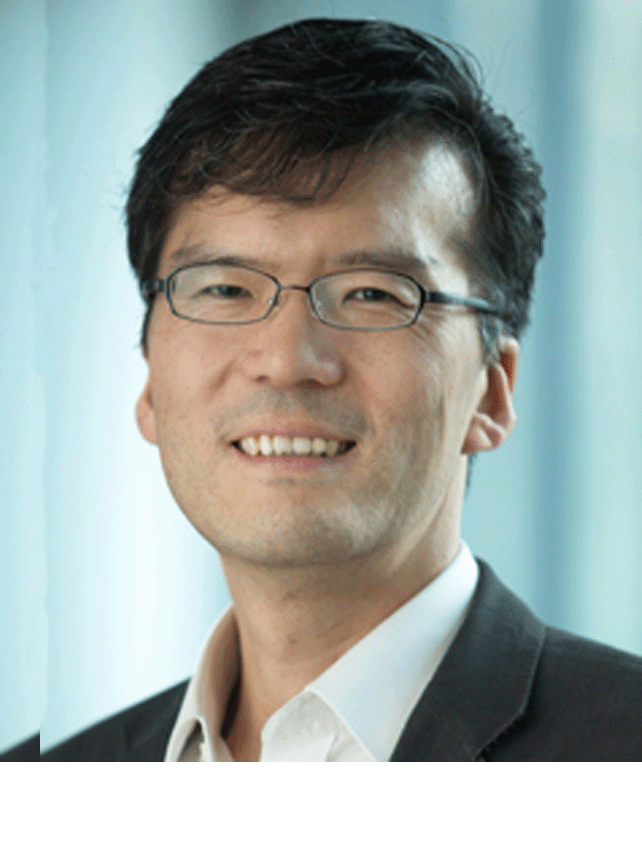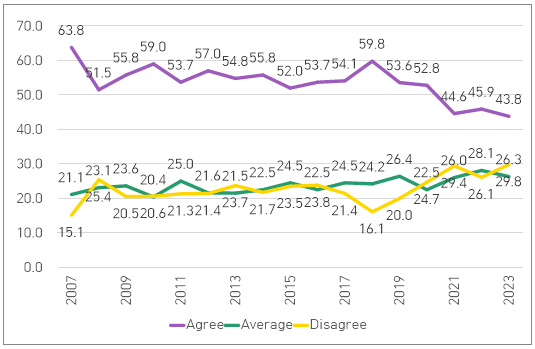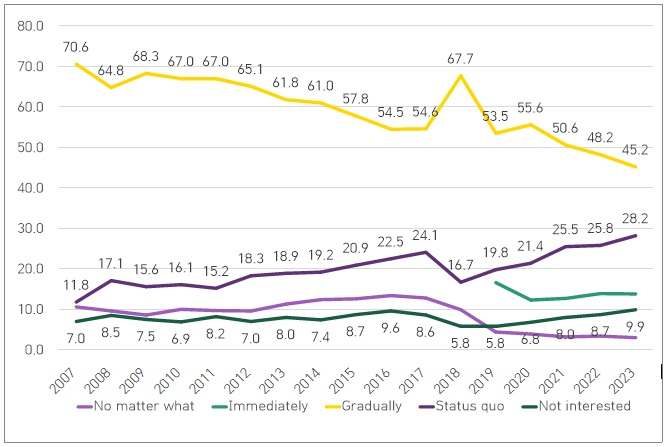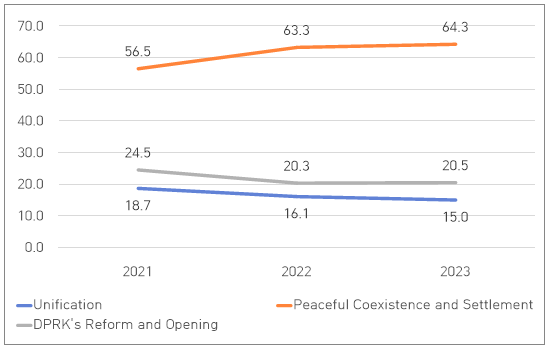From Unification to Peaceful Coexistence
- Commentary
- October 31, 2023

- Bumsoo KIM
- Director, Institute for Peace and Unification Studies (Seoul National University)

Bumsoo Kim, Director of the Institute for Peace and Unification Studies (IPUS) at Seoul National University, analyzes the shifting South Korean public perceptions toward the unification of the peninsula. Based on the results of “2023 IPUS Unification Consciousness Survey,” Kim explains that with the newer generation reluctant or even indifferent about unification, the majority of South Korean citizens favor “peaceful coexistence and settlement.” Pointing out that South Korea’s past North Korea policy, which aimed to establish a “one nation, one state, one system, one government,” is outdated, Kim argues that the ROK government should instead recognize North Korea as a sovereign state, redefine bilateral relations accordingly, and pursue peaceful coexistence.
“Unification is our wish”
In the decades since the division of the Korean Peninsula, unification has been considered the ultimate goal of the South Korean government’s DPRK policy. For instance, the Syngman Rhee government advocated for the “unification of the Korean Peninsula by military force,” denying North Korea’s statehood and legitimacy based on the logic that “the government of the Republic of Korea is the only legitimate government on the Korean Peninsula recognized by the United Nations (UN).” From Syngman Rhee’s perspective, North Korea was merely a rogue regime that had illegally occupied the indigenous territory of the Republic of Korea. This territory, as defined in the Constitution, included “the Korean Peninsula and its adjacent islands.” In this context, North Korean territory was seen as an area which the Republic of Korea would eventually have to reclaim and unify by absorption.
The South Korean government’s official stance that North Korea is an enemy that must ultimately be unified by absorption has been consistently upheld by successive governments since the Korean War, despite numerous constitutional amendments and regime changes. In particular, the current Constitution, which was amended in October 1987, not only retained the territorial provision (Article 3) stating that “the territory of the Republic of Korea shall consist of the Korean Peninsula and its adjacent islands,” but also newly added Article 4 stating that “the Republic of Korea shall seek unification and shall formulate and carry out a policy of peaceful unification based on the principles of freedom and democracy,” thereby making it clear that unification is a constitutional value to which the Republic of Korea should aspire.
Based on these provisions, successive governments since the country’s democratization in 1987 have set unification as the ultimate goal of their North Korea policy, albeit variations in their approach to the regime. For example, the Kim Young-sam administration, which took office in 1992, adopted the “Three-Stage Unification Formula for Building a Single National Community” (i.e. “National Community Unification Formula”) as the government’s official unification plan. This formula included reconciliation and cooperation as the first stage, South-North confederation as the second stage, and the completion of the unified state as the third stage. It also formalized the establishment of a unified state of “one nation, one state, one system, and one government.” This official position has remained largely unchanged over the past 30 years, despite several shifts between liberal and conservative governments.
Increased negative perceptions on the need for unification
Despite the Constitution and the government’s strong emphasis on unification, recent public opinion surveys have revealed a steady increase in negative perceptions regarding its necessity. According to the results of the “Unification Consciousness Survey,”[1] which has been conducted annually since 2007 by Seoul National University’s Institute for Peace and Unification Studies (IPUS), the number of respondents who either believed that unification was “very necessary” or “somewhat necessary” reached a high of 63.8% in 2007, but has since consistently fallen to 43.8% in 2023, marking the lowest since the survey was first conducted in 2007. On the contrary, the response “Disagree”, which combines the number of respondents who answered either “not much need” or “no need at all,” has increased from 15.1% in 2007 to 29.8% in 2023, the highest since 2007 (see Figure 1).
Figure 1. Trends in Public Perceptions Toward Necessity of Unification (2007-2023) (Unit: %)

Figure 2. Trends in Views on Unification (2007-2023) (Unit: %)

Moreover, trends in views on unification as depicted in Figure 2 reveals a shift in public opinion. The proportion of respondents favoring “gradual” unification has been decreasing, while the number opting for “status quo” or expressing “no interest in unification” has been steadily increasing. In the 2023 survey, only 45.2% supported “gradual unification,” the lowest since the survey began. Conversely, 28.2% favored maintaining the “status quo,” and 9.9% indicated having “no interest in unification,” both figures marking the highest levels. These trends indicate a growing apathy within the Korean society towards unification, coupled with an increasing preference for the current state of division.
Peaceful co-existence is more important than unification
Meanwhile, concerning the final goal of South Korea’s North Korea policy, the results from the “Unification Consciousness Survey” reveal that a significant majority of South Koreans prefer “peaceful coexistence and settlement.” This approach advocates for an end to hostilities and a peaceful coexistence of the two Koreas over outright “unification.” As illustrated in Figure 3, when asked, “What should be the most important goal of our government’s North Korea policy?,” over 60% of respondents selected “peaceful coexistence and peaceful settlement,” while less than 20% chose “unification.”
Figure 3. Goal of North Korea Policy (2021-2023) (Unit: %)

Conclusion
The results of the “Unification Consciousness Survey” demonstrate a significant shift in South Korean attitudes since the division of Korea. Negative perceptions and apathy towards the need for unification are increasingly evident, as the vast majority of South Koreans now prioritize “peaceful coexistence and settlement” as the primary goal of the government’s North Korea policy. This approach favors an end to hostilities and a peaceful coexistence of the two Koreas as separate entities over a unified Korea where the North and South would merge into a single nation.
Given such shifting attitudes, what direction should the South Korean government take with regards to North Korea? Should we continue to emphasize unification as a “historical mission of our nation,” as in the past, and establish and pursue a unification policy based on the “principles of freedom and democracy,” as specified in the Constitution? Or should we change the paradigm of our North Korea policy to focus on peaceful coexistence, in line with the changed circumstances of the times?
The results above suggest that the past policies which emphasized the establishment of a unified country of “one nation, one state, one system, and one government” need to be revised. With the majority of South Koreans now believing that unification is unnecessary and that the goal of North Korea policy should be peaceful coexistence, the emphasis on unification as the historical mission and a constitutional value seems against the “Zeitgeist” of our times. Particularly, the government’s official stance, which denies North Korea’s statehood based on the territorial clause and views North Korea as a rogue regime illegally occupying territory of the Republic of Korea, warrants reconsideration. This need is especially pronounced given the de facto existence of two states on the Peninsula since North and South Korea simultaneously joined the United Nations on September 17, 1991. Reflecting reality, a more desirable North Korea policy would be to recognize the DPRK as a separate and independent sovereign state, redefine the relationship between the two Koreas as a state-to-state relationship,[2] and promote peaceful coexistence.
Of course, recognizing North Korea’s sovereignty and shifting the paradigm of North Korea policy from unification to peaceful coexistence is not an easy task. This would require, among others, an amendment to the Constitution. Given the polarized domestic politics South Korea, realizing such changes appear improbable. However, in light of the growing public disfavor towards the idea of unification and the increasing preference for peaceful coexistence, it is inevitable that South Korea’s North Korea policy requires a long-term revision. Close attention must be paid to how South Korea’s government adapts its North Korea policy in response to the evolving inter-Korean dynamics and the changing international context. ■
[1] From 2007 to 2023, Seoul National University’s Institute for Peace and Unification Studies has commissioned Gallup to survey 1,200 adult men and women nationwide on their perceptions of unification, their perceptions of North Korea, and their evaluations of and attitudes toward the government’s North Korea policy. The 2023 survey was conducted by door-to-door interviews with 1,200 adult men and women aged between 19 and 74, living in 17 provinces across the country and over a 24-day period from July 4 to July 27. The survey used a structured questionnaire and has a margin of sampling error of ± 2.8% at the 95% confidence level.
[2] Article 3 of the Development of Inter-Korean Relations Act, which was enacted in 2006 and continues to legally define inter-Korean relations, stipulates that “Inter-Korean relations are not state-to-state relations, but special relations established temporarily in the course of pursuing unification,” and that “Inter-Korean trade shall not be regarded as international trade, but as intra-national trade.”
■ Bumsoo KIM is the Director of the Institute for Peace and Unification Studies (IPUS) and Dean of the College of Liberal Studies at Seoul National University.
■ Typeset by Jisoo Park, Research Associate
For inquiries: 02 2277 1683 (ext. 208) | jspark@eai.or.kr